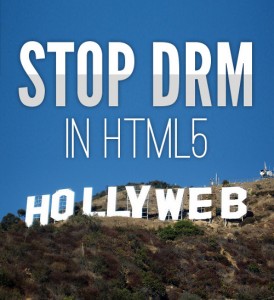W3C takes a step nearer the Hollyweb; FSF responds

At the end of April, Defective by Design and a coalition of 26 other organisations, including Bristol Wireless, publicly opposed the proposal in a letter to the W3C (news passim). Last week, on International Day Against DRM, Defective by Design delivered tens of thousands of signatures opposing the proposal and continues to collect petition signatures.
In response to the W3c’s announcement, the Free Software Foundation‘s executive director John Sullivan has issued the following statement:
We and the 26,000 concerned individuals who signed Defective by Design’s petition so far are extremely disappointed in the W3C’s statement today. The situation is actually worse than we thought, because the W3C now appears to be bizarrely insisting that Digital Restrictions Management (DRM) is a necessary component of a free Web. We were under the impression that the standardized Web was meant to be a structure that mitigated against holders of particular proprietary technologies bullying Web users and developers, or extracting royalties from them as preconditions for participation. If companies want to do such bullying, they can do it on their own time and their own dime; the W3C should not help them or endorse them. In this statement, the W3C unfortunately hitches its wagon to the contentious and frankly irrelevant empirical claim that DRM is key to what Microsoft during the Vista launch referred to as a ‘next generation content experience.’ In adopting the doublespeak of the Hollyweb, the W3C is betraying the interests Web users have in experiencing the amazing universe of human culture enabled by the Internet. Instead, they are backing the desire of Netflix, Google, and Microsoft, to capture those users in media silos with walls enforced by proprietary software and criminal law like the Digital Millennium Copyright Act (and similar laws around the world). Despite the W3C’s claim to have listened, we do not feel heard. We will step up our efforts to stop them from committing this terrible error, including issuing a comprehensive refutation of this statement’s reasoning.
